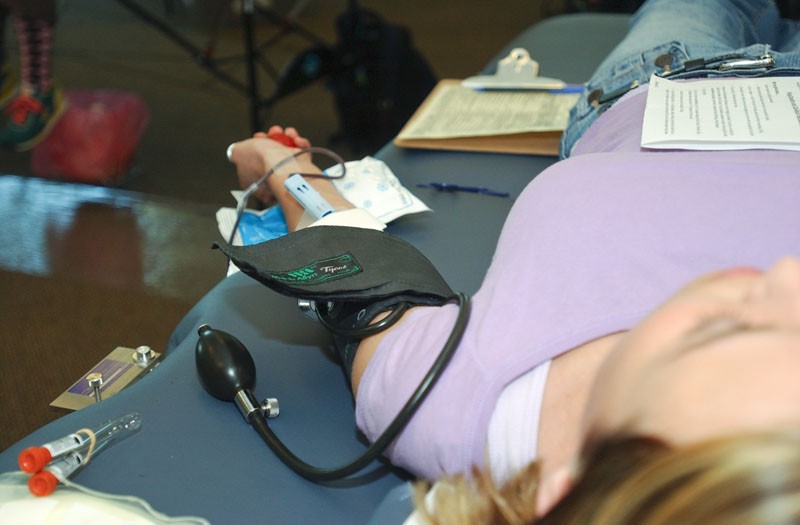BANNED

GVL Archive GVSU hosts frequent blood drives throughout the semester
Apr 11, 2012
When Grand Valley State University senior Zachery Brown first heard that his blood wouldn’t be accepted during the April 3 blood drive at the Pew Campus, he was shocked. Brown has an O- blood type, making him a universal donor, and he didn’t understand why his sexual orientation would be enough to restrict him from giving.
“I’ve been giving blood for however long and you know, I’m a universal donor,” Brown said. “… I feel like it’s really important to give blood and that’s my giving back, I guess.”
Brown has been giving blood since high school, and giving blood at GVSU student since 2008, but this is the first time he was turned away.
“Usually, you fill out the form and then she’d take my blood test and then do the scans,” Brown said. “But what happened was, I just got through the part where I have to answer questions, and she saw that I had sex with men and she said, ‘You can’t give blood.’”
Brown, finding the rejection both offensive and unnecessary, wasn’t aware until that moment of the U.S. Food and Drug Administration’s MSM gay blood ban.
The policy, as outlined in the American Red Cross’ eligibility criteria on their website, permanently defers any male “who has had sexual contact with another male (MSM), even once, since 1977” on the basis that they are at high-risk for transmitting diseases.
Though the type of deferral is not unique to GVSU, it is rare. In fact, it’s the first time in his almost 10 years working with Pew Campus blood drives that Steve Lipnicki, assistant dean of students, has heard of a student who was turned away. The drives, though hosted by the university, are conducted and facilitated by the American Red Cross and Michigan Blood, which must comply with FDA regulations.
“While in full support of continuing to offer on-campus drives that provide essential life-giving products to our entire community, I also support the ongoing efforts by numerous groups nationwide to have the FDA revisit the validity of their guidelines,” Lipnicki said.
Brown’s rejection was not only a surprise to Brown and Lipnicki, but also the nurse conducting the pre-donation survey.
“The lady who interviewed me said that she’s only had that answered one other time,” Brown said, adding that he thinks a lot of other people who have been sexually active with another men since 1977 may be hesitant to answer honestly during the survey
“I think a lot of people don’t say anything, if I had to guess,” he said. “First of all, I don’t know if it’s the question itself or if it’s just like, who is this random person who is asking me if I’m gay or not?”
And he would know, since it’s the first time he had answered truthfully himself.
“I wasn’t really out of the closet until last year,” Brown said. “So, finally this is the first time I was kind of like OK, you know, this is something I should just be open about, but then this time they said it was high-risk behavior.”
The FDA’s regulations regarding MSM blood deferrals has been a nationwide controversy since it’s origins, when the ban was originated in the early ’80s as a precautionary measure against the spread of HIV and AIDS as a response to the growing epidemic at the time.
Now, many argue that the policy is outdated considering the public is generally much more educated about safe sex, in combination with more advanced screening technology.
“Then, this kind of thing, where if they are going to screen it anyway and they have really good technology now, they should take everybody’s blood; but to just totally take out a whole segment and say, ‘You’re at such a high risk we don’t even want to take the time to screen your blood and see if it’s good’ — I just don’t think that’s right,” Brown said.
The Gay Men’s Health Crisis, an organization created in 1982 that aims at raising awareness about and working toward the prevention of HIV and AIDS, is among many advocating for the repeal of the regulations.
On their website, GMHC has an online petition calling for reform on the ban, and writes: “Although this policy was created in the early years of the epidemic, when little was known about HIV, the current policy fails to maximize blood safety and excludes many potential gay and bisexual male donors who are at low-risk for HIV.”
Colette Seguin Beighly, director of the LGBT Resource Center at GVSU, echoed the GMHC’s reasoning.
“We recognize the importance of having a safe national blood supply,” she said. “However, with the improved testing methods now available, to continue to exclude MSM donors seems both archaic and draconian and only further serves to unnecessarily stigmatize an already marginalized community.”
Despite the still-prevalent regulations, advocacy efforts aren’t going completley unnoticed. The Department of Health and Human Services, under the Obama administration, issued a notice published in the Federal Register in March, announcing plans to study alternatives for the ban.
“”… The increased effectiveness of donor testing for [Human Immunodeficiency Virus (HIV)], [Hepatitis B Virus (HBV)], syphilis and other infectious agents has greatly enhanced blood safety,” the notice read.
“I think it was a rule that there was a time when it was needed,” Brown said. “I can understand there was a huge AIDS epidemic and that was probably the best way and the technology then probably wasn’t the best to protect it, but nowadays we have better technology … It’s just an inappropriate law, I think, or rule that because I’m gay I can’t give blood.”
For more information about the MSM Blood Ban and GMHC’s efforts, visit www.gmhc.org. For more information about donating blood at GVSU, visit www.gvsu.edu/service/blood-drives-on-campus-59.htm.























